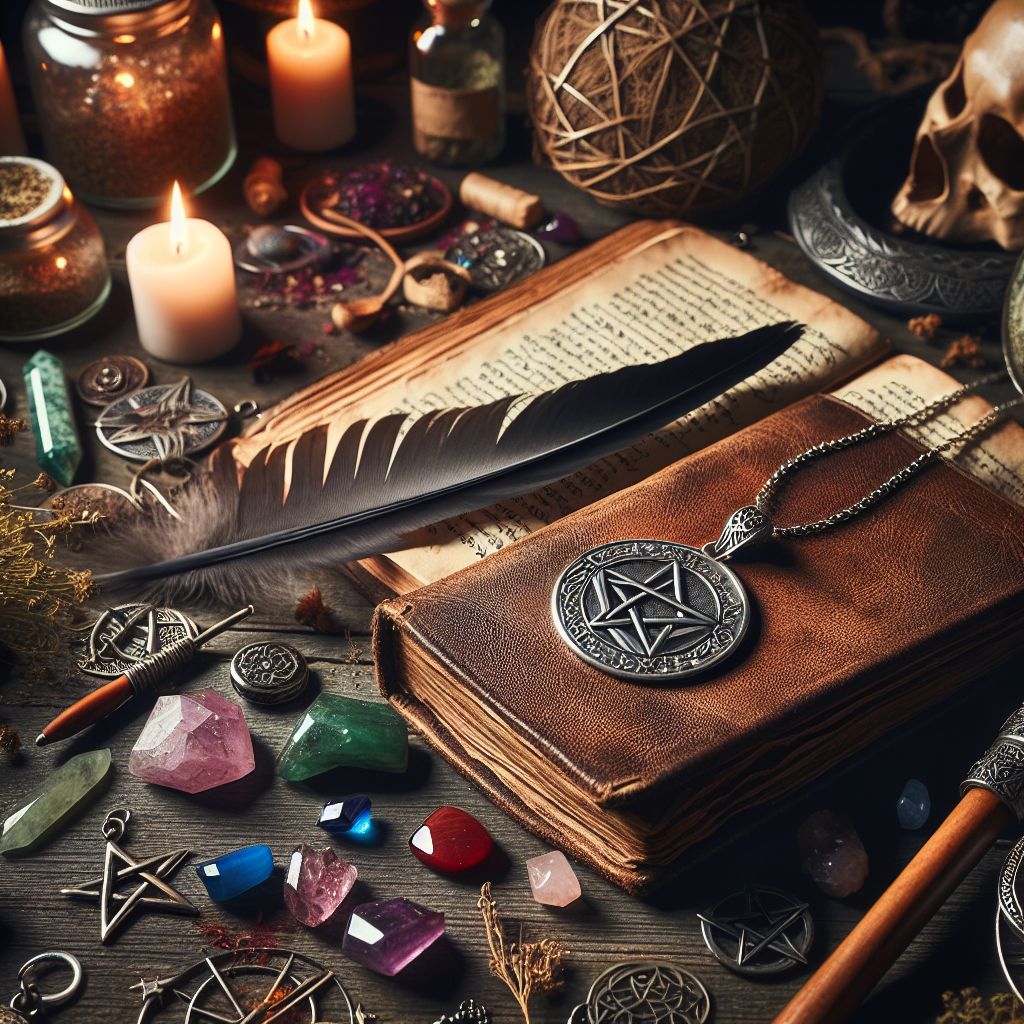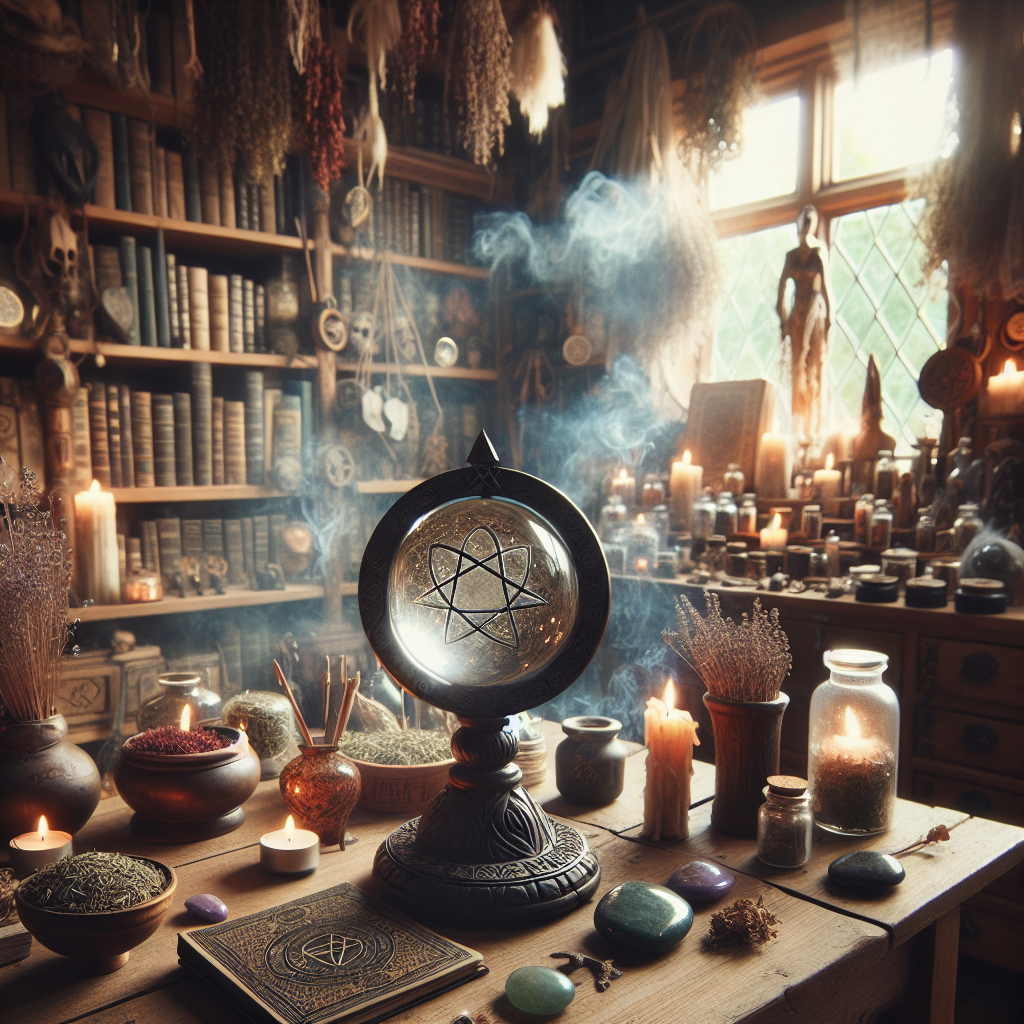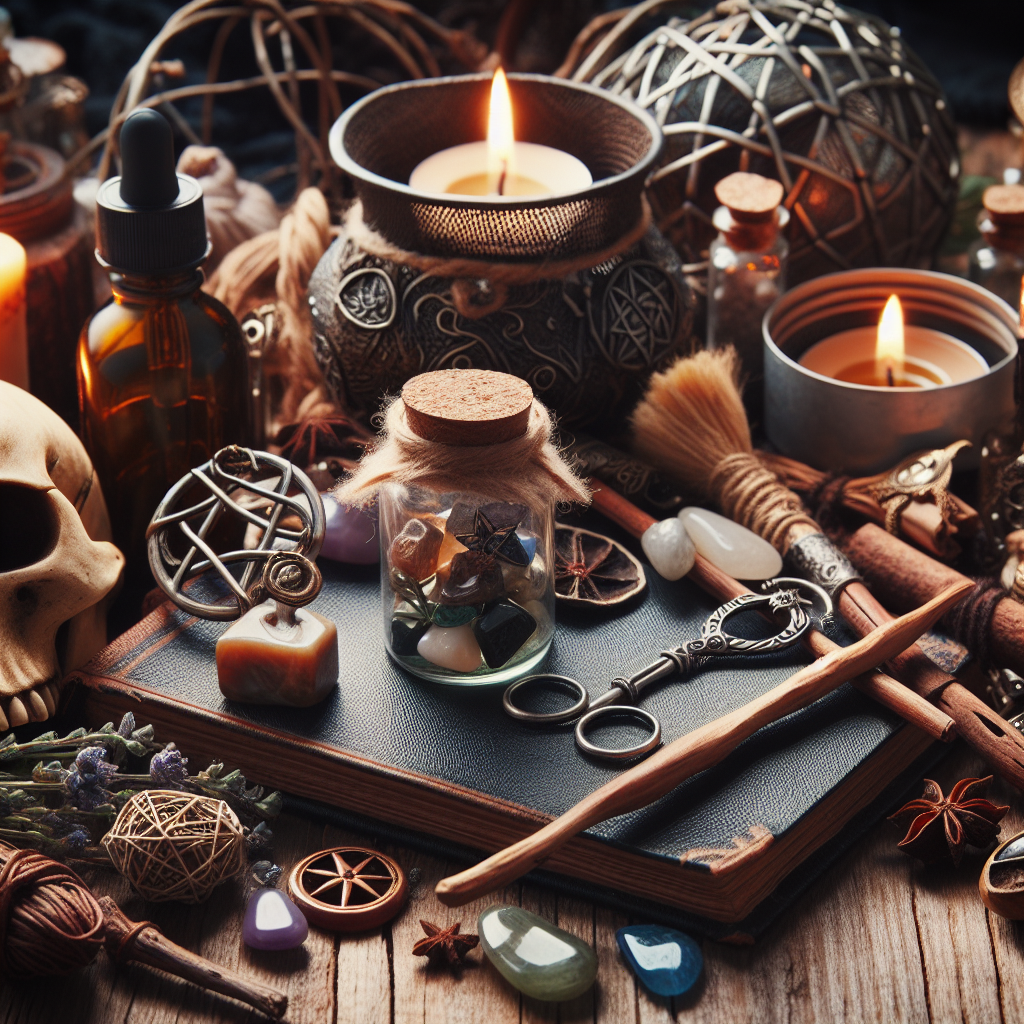As an Amazon Associate I earn from qualifying purchases.

Wicca, a modern pagan religion that celebrates nature and incorporates both ancient and contemporary ritual practices, places a significant emphasis on the use of specific supplies and tools in its ceremonies and personal practices. Often, these tools are considered extensions of the practitioner’s own personal energy and aid in focusing and directing the magical energies that Wiccans believe permeate the world around us.
The roots of Wicca can be traced back to the early 20th century, with its modern form popularized in the 1950s by figures such as Gerald Gardner. Since those formative years, an eclectic array of tools and supplies have come to be widely accepted among practitioners as essentials for their craft. These supplies are often used within rituals, spellcasting, and personal meditations to establish a sacred space and invoke the desired energies or deities.
One of the most iconic tools in Wicca is the athame, a ceremonial dagger that symbolizes the element of air and is used to direct energy, typically within the casting of a ritual circle. Unlike a mundane knife, the athame is not used for physical cutting but serves as a metaphysical boundary marker in ritual practices. It represents the power of discernment and the intellectual aspect of magic.
Another key tool is the wand, traditionally associated with the element of fire. Wands are used for invocation and can be crafted from various materials, including wood, metal, or crystals. Each practitioner may choose a wand that corresponds with their personal energy or the specific intention of their work, making it a highly personalized implement within their magical toolkit.
Incorporating the earth element, the pentacle—a disk often made of wood, metal, or clay, inscribed with a pentagram—is utilized as a protective symbol and a tool for consecrating other magical objects. The pentagram, a five-pointed star within a circle, is sometimes regarded as a symbol of the five elements (earth, air, fire, water, and spirit), and it has become a symbol commonly associated with Wicca and wider Pagan traditions.
Candles also play a central role in Wiccan practice, serving as representations of the element of fire. They aid in setting the ambiance for magical work and are often used to represent the God and Goddess on the altar. The colors of candles can be significant and are frequently chosen based on their correspondences with specific intentions or energies in spellwork.
Furthermore, herbs hold a venerable place in Wicca, used for their properties in spellcrafting, healing, and as offerings. The use of a mortar and pestle to grind herbs is not only practical but also symbolic, as it represents the blending and altering of natural substances to align with the practitioner’s magical intentions.
Statistically, the practice of Wicca has seen an increase in followers in the past few decades, with a corresponding rise in the availability of Wiccan supplies. This has not only made it easier for practitioners to obtain traditional tools but also contributed to a greater public awareness and understanding of the religion.
These tools, while widely regarded as standard in the Wiccan community, are merely aids to focus the intentions and energies of the practitioner. They serve as conduits for the innate power that Wiccans believe lies within themselves and the world around them. The choice to use or refrain from using any specific tool is deeply personal and often reflects the individual’s beliefs and the traditions of their particular path within Wicca.
“`html
What Are the Key Wiccan Supplies Required for Every Practitioner?
“`
Wiccan supplies are a fundamental aspect for anyone practicing Wicca, as they play a critical role in rituals and spells. These supplies generally include items like candles, which are used for focus and manifesting intentions; crystals, which are believed to hold different energies and healing properties; a wand for directing energy; an athame or ritual knife for symbolic cutting; a pentacle for protection and the representation of earth; incense for cleansing and purifying spaces; and altar cloths to define sacred space. The right tools can significantly enhance the effectiveness of the rituals and the practitioner’s connection to the elements, deities, and the energy they wish to channel. The subsequent sections will delve deeper into the uses, meanings, and sourcing of these essential Wiccan supplies, providing a comprehensive guide for newcomers and seasoned practitioners alike.
Wiccan supplies form the cornerstone of many rituals and practices within the Wiccan religion. Practitioners, often referred to as Wiccains, draw on a variety of tools to perform rites, cast spells, and honor the gods and goddesses of their faith. Here are some of the most essential supplies that every Wiccan should consider incorporating into their spiritual toolkit:
**1. Altar:**
A central feature in Wiccan practice, the altar serves as a sacred space where rituals are performed and offerings are made. It can be as simple as a small table or shelf, adorned with items significant to the practitioner.
**2. Athame:**
This ceremonial knife represents the element of fire and is used to direct energy, rather than for physical cutting. It is traditionally double-edged and can be adorned with various symbols or stones to align with the user’s intentions.
**3. Wand:**
Symbolizing the element of air, a wand is used in ritual to invite and direct energies. While they can be purchased, many Wiccans prefer to make their own from wood, metal, or crystals to personalize the connection.
**4. Chalice:**
Usually linked to the element of water, the chalice holds substances used in rituals, most commonly wine or water, which are often shared during ceremonies as a symbol of unity and blessing.
**5. Pentacle:**
A disc or plate made of metal, wood, or clay, the pentacle displays a five-pointed star within a circle. It is a powerful symbol of protection and is considered essential for grounding and centering energy during a ritual.
**6. Candles:**
Candles are a staple in Wiccan rituals, as they represent the element of fire and are used to focus energy and intention. Different colors signify various purposes and are chosen depending on the type of spell or ritual being performed.
**7. Incense and Burner:**
Incense is burned to purify the area, carry prayers to the deities, and to help shift consciousness. The burner often corresponds to the element of fire or air, depending on its design and usage.
**8. Herbs and Oils:**
These are selected for their magical properties and are used in a multitude of ways, including spellwork, anointing, and during the creation of talismans or amulets.
**9. Book of Shadows:**
A personal grimoire, or Book of Shadows, is where a Wiccan records their rituals, spells, and notes from their spiritual journey. This is a deeply personal item and is often hand-written by the practitioner.
**10. Crystals and Stones:**
Widely used for their energetic properties, crystals are employed in healing, as focal points for meditation, and as aids in spellcraft. Each stone has its own attributes that correspond to different aspects of Wiccan belief and practice.
The importance of each item can vary widely depending on the tradition of Wicca a practitioner follows. Some may prioritize the natural elements found in their surroundings, while others may invest in intricately crafted ritual tools. Despite the differences, these tools collectively serve to enhance the spiritual experience of the Wiccan practitioner.
In terms of the market for Wiccan supplies, it’s notable that approximately 1.5 million people identify as Wiccan or Pagan in the United States alone. This community often supports a vibrant economy of artisans and shopkeepers who specialize in crafting and selling Wiccan ritual items. Each of these supplies carries both a symbolic meaning and practical application, essential for the diverse practices found within the expansive world of Wicca.
The basic tools commonly used by Wiccan practitioners include the athame (ceremonial knife), the wand, the pentacle (a disc with a pentagram), the chalice (goblet), the cauldron, incense, candles, and an altar cloth. These items are often considered essential for casting circles and performing rituals.
Absolutely. Many Wiccans believe that intent is more critical than the actual tools. For example, a kitchen knife can substitute an athame, a tree branch can serve as a wand, and a simple cup can take the place of a chalice. Personalizing your toolkit can make your practice more meaningful.
Quality can be important, but it is not the defining factor for effective practice. The strength of your intention and your dedication to the craft are much more significant. However, durable and well-crafted supplies can last longer and may hold more personal value to a practitioner.
Wiccan supplies can be obtained from various sources, such as specialized metaphysical stores, online retailers, craft fairs, or even nature itself. Some practitioners prefer to create their supplies to imbue them with personal energy and significance.
Supplies can be cleansed of any previous energies by smudging with sage, placing them in moonlight, burying in salt, or through visualization techniques. Consecration is typically done through a ritual that dedicates the tools to the practitioner’s service and may involve anointing with oils and charging with intention.
Yes, different colors of candles correspond to various purposes and energies. For example, black for protection, green for prosperity, red for passion, and white for purification. It’s beneficial for a Wiccan practitioner to have a selection of colored candles to use in spells and rituals.
Wiccan rituals can absolutely be performed with minimalistic setups or even just visualization. The tools and supplies are aids to focus intention and energy but are not strictly necessary. Your own personal power and intention are the most paramount elements of any ritual.
Yes, you can purchase used Wiccan supplies. Many practitioners find value in items that have a history. It is recommended, though, to cleanse and consecrate them before use to align the items with your energy.
Herbs are used in many ways, such as in spells, for making incense, in sachets, or to anoint candles. While growing your own herbs can be a rewarding part of the practice, it is not necessary. Herbs can be purchased from stores, as long as they are of good quality and have been stored properly.
The pentacle, often a star within a circle, symbolizes the elements of earth, air, fire, water, and spirit. It is a protective symbol and is used to invoke and control these elemental forces during magical workings. The pentacle is a key symbol in Wiccan rituals and is often found on altars and ritual tools.

Conclusion
Having delved into the myriad of essential Wiccan supplies, it is apparent that certain tools and symbols hold significant meaning and function within the practice. The altar serves as the sacred space where rituals and spells are performed, and it’s typically adorned with items like the athame, wand, chalice, and pentacle that each serve a specific purpose. Herbs, crystals, candles, and incense are also crucial, as they act as manifestations of the natural elements and are used to attract, repel, or channel energies during spells and ceremonies. These supplies are not just tools, but are extensions of the practitioner’s intentions, and selecting them with care and respect is essential to their effectiveness.
Understanding the symbolism and proper use of each item is key in amplifying a practitioner’s focus and enhancing the spiritual connection. Although the physical presence of these items contributes to the practices of Wicca, it is the intention behind their use that activates their true power. Wiccans must remember that while the standard supplies can aid in creating a focused and consecrated environment, it is their own personal connection, belief, and commitment to their path that are the most powerful tools at their disposal. The selection of these supplies should be a reflective process, ensuring they resonate with the individual’s spirit and the specific traditions they follow within the Wiccan faith.
Amazon and the Amazon logo are trademarks of Amazon.com, Inc, or its affiliates.


